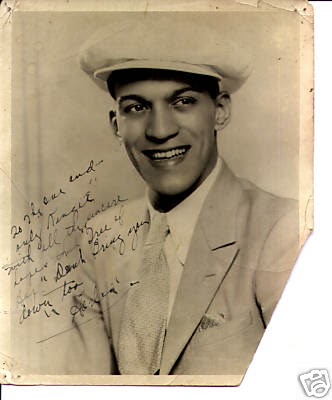For
every singer like Bing Crosby or Frank Sinatra that become mega stars in their
profession, there are footnotes in the business as well. These footnotes are
people who have a great talent, there is no denying that but they just never
made it to the heights of Crosby or Sinatra. Harlan Lattimore was one such
person who never made it.
Harlan Lattimore was born in
Cincinnati,Ohio to on November 25, 1908 to first generation freed slaves.
Lattimore was a popular African-American singer with several jazz orchestras of
the 1930s, most notably Don Redman's. He was known as "The Colored Bing
Crosby", an unfortunate title because Lattimore was talented on his own.
He built his
reputation as a singer on that city's WLW radio station. By March 1932, he had
arrived on the New York music scene, and began his recording career with Fletcher Henderson's band. Not long afterwards, Lattimore
was signed by Don Redman as his vocalist. This association
lasted throughout the 1930s.
His style of
singing, as well as the timber of his beautiful voice, closely resembling that
of Bing Crosby, earned him recording dates with some of the top studio and dance bands of
the era, most notably those of Victor Young, Abe Lyman and Isham Jones, as well a number of dates as vocalist for a number of generic dance
records for ARC (on Melotone, Banner, Oriole, Romeo, and Perfect).
The 1933
Vitaphone short, Don Redman and his
Orchestra is included on the Warner Brothers DVD of Dames, where he
sings a beautiful rendition of Harold Arlen's "Ill Wind", which the Redman band never recorded. With the
exposure of Lattimore to the public through radio broadcasts (with Don Redman),
recordings and an appearance in a Vitaphone short subject film (with Redman),
it seemed a foregone conclusion that he was headed for stardom. This was not to
be.
Lattimore's
behavior became unreliable and erratic in the mid 30's, and he made his last
recordings with Redman in 1936. A 1940 Census shows that Lattimore did a stint in Sing Sing Prison, and at the time of his incarceration he was also married. Depression and alcoholism took over Lattimore's
life, but he pulled it together to join the military in 1942. After service in
WWII, he dropped out of the music scene. It was reported a war injury and a
return to alcoholism cause Harlan to further withdraw from everything. Except
for an attempt at a comeback, in the late 40's, Harlan Lattimore slid further
and further into musical obscurity until his death in 1980. He reportedly died
in July of 1980 in Brooklyn, New York...broke and penniless.
Although the
name Harlan Lattimore is now looked upon as a mere footnote in American popular
music, there can be no denying his role as a pioneering African-American singer
who established a style and role later filled by such musical luminaries as Billy Eckstine and Nat King Cole. Harlan Lattimore was a great singer
when it was difficult and virtually impossible for an African-American to get ahead.
He deserves to be remembered even though he is a mere footnote in the history of
popular music…


"...he deserves to be forgotten"? Shouldn't that be "remembered"?
ReplyDeleteYou are so right! Sorry about that. That makes the ending a lot better!
ReplyDelete